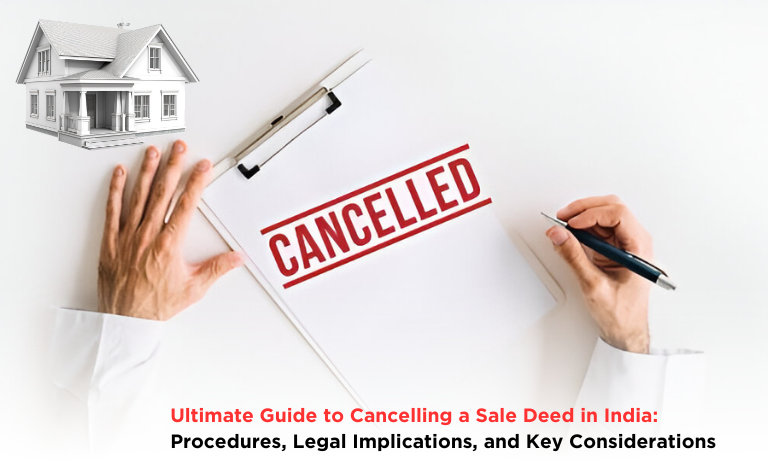Ultimate Guide to Cancelling a Sale Deed in India: Procedures, Legal Implications, and Key Considerations

The sale deed is a crucial legal document that completes the transfer of property ownership from the seller to the buyer. It serves as proof of the buyer’s rights to the property and is typically registered with the sub-registrar. However, in certain situations, it may become necessary to cancel or revoke a sale deed. If you are considering cancelling your sale deed, understanding the process, legalities, and implications is essential. This article provides a step-by-step guide to help you navigate the sale deed cancellation process in India.
When Can a Sale Deed Be Cancelled?
A sale deed may be cancelled after it has been duly registered, and there are several valid reasons for doing so. Some of the most common grounds for sale deed cancellation include:
1. Mutual Agreement Between Buyer and Seller
If both the buyer and seller agree to cancel the sale, it can be revoked. This often happens when both parties have changed their mind or no longer wish to proceed with the transaction.
2. Breach of Agreement Terms
If either party fails to comply with the terms of the sale agreement, such as non-payment or failure to deliver the property as promised, the sale deed may be cancelled.
3. Fraud or Misrepresentation
If either the buyer or seller commits fraud or misrepresents information related to the property or the transaction, the affected party may seek cancellation of the deed.
4. Inability to Perform the Agreement
A sale deed can be cancelled if it is determined that one party is unable to fulfill their obligations under the agreement. For instance, if a seller cannot transfer clear title to the property, the deed may be revoked.
5. Title Disputes or Encumbrances
If an encumbrance certificate reveals that the title of the property is unclear or disputed, the sale deed may be subject to cancellation.
6. Material Errors in the Sale Deed
In the case of significant errors in the sale deed, such as incorrect property details or names, the deed may be cancelled. However, minor errors can typically be corrected through a rectification deed.
7. Coercion or Pressure
If any party is forced into signing the sale deed under duress or undue pressure, they have the right to cancel the agreement. Proof of coercion must be provided in such cases.
8. Void or Voidable Contracts
A sale deed may also be considered void or voidable if the contract is unenforceable due to one of the parties being incompetent or lacking the necessary legal capacity.
Step-by-Step Guide to Cancel a Sale Deed
Cancelling a registered sale deed is a legal process that involves several steps. Each step must be followed carefully to ensure a smooth and effective cancellation.
Step 1: Obtain Consent from Both Parties
For the cancellation to proceed smoothly, both the buyer and the seller must mutually agree to cancel the sale deed. This consent can be documented in the form of a cancellation deed.
Step 2: Draft the Cancellation Deed
Once both parties have agreed to cancel the sale, a cancellation deed must be drafted. This deed should clearly state the reasons for the cancellation, the details of the original sale deed, and the mutual agreement of both parties. It must be executed on stamp paper of appropriate value.
Step 3: Register the Cancellation Deed
The cancellation deed must be registered with the sub-registrar where the original sale deed was registered. The cancellation deed will then be officially recorded, and the original sale deed will be revoked.
Step 4: Notify the Affected Party
If the cancellation is due to fraud or misrepresentation, the aggrieved party must send a written notice to the other party informing them of the intention to cancel the sale deed.
Step 5: Legal Action if Consent is Not Given
If both parties cannot reach an agreement on the cancellation, the party seeking the cancellation must file a civil suit in the relevant court. The court will review the case and make a judgment based on the merits of the claim.
Legal Procedure for Cancelling a Sale Deed
The legal procedure for cancelling a sale deed can be complex, and it involves going through the court system in certain cases. Below are the steps involved in legally cancelling a sale deed:
Step 1: Filing a Civil Suit
The person seeking cancellation must file a civil suit in the appropriate court. Depending on the property value, a court fee will be required. The court will then review the details of the case, including the reasons for seeking cancellation.
Step 2: Court Proceedings
The court will give both parties an opportunity to present their arguments and evidence. It will then examine whether the cancellation is justified based on fraud, error, or breach of contract.
Step 3: Court Order
If the court finds valid grounds for cancellation, it will issue an order to cancel the sale deed. A copy of this order will be sent to the original registration office.
Step 4: Registration of Cancellation
The sub-registrar will record the cancellation order and mark the sale deed as "Cancelled" in the official records. This process updates the property’s ownership records to reflect the new status of the transaction.
Step 5: Returning the Property to Its Original State
Once the deed is cancelled, the parties may sign a new deed to transfer ownership, depending on the circumstances. If the cancellation was due to non-payment or other issues, the party at fault may be required to pay compensation or damages.
Step 6: Finalizing Property Records
Once the deed is cancelled, municipal and government records will be updated to reflect the cancellation. This includes updating tax records and other property-related documents.
Court Fees for Sale Deed Cancellation
Filing for a sale deed cancellation involves a court fee, which varies based on the value of the property. According to Article 17(iii) of the Court Fee Act, the minimum court fee is Rs. 19.50, but this may vary depending on the property’s valuation. The petitioner is required to pay this fee upfront before the court accepts the case. Failure to pay the fee may result in the case not being scheduled for hearing.
In cases where the petition is successful, the court may order the opposing party to bear the fees. However, it’s essential to pay the fee upfront to initiate the legal proceedings.
Legal Implications of Cancelling a Sale Deed
Cancelling a sale deed has several legal implications. The process must adhere to the relevant laws and regulations to ensure fairness and justice. Some of the key legal frameworks governing sale deed cancellations include:
- Section 31 of the Specific Relief Act, 1963: This section allows a party to seek cancellation of a contract, including a sale deed, if it is found to be defective or voidable.
- Registration Act, 1908: This Act mandates that a cancellation deed must be registered to revoke a previously registered sale deed.
- Indian Contract Act, 1872: This Act provides provisions for cancelling contracts based on fraud, misrepresentation, or other legal grounds.
- Civil Procedure Code (CPC), 1908: This Code provides the procedural framework for filing a suit to cancel a sale deed and obtaining a court order.
Limitations on Sale Deed Cancellation
While the process for cancelling a sale deed is legally valid under certain circumstances, there are some important limitations to be aware of:
1. Valid Grounds for Cancellation
Sale deeds can only be cancelled for valid reasons, such as fraud, misrepresentation, or breach of contract. Any cancellation without a justified cause will be considered void.
2. Consent of Both Parties
In some cases, both the buyer and seller must agree to the cancellation. If one party refuses, the process may require legal intervention.
3. Timely Action
It is essential to seek cancellation within a reasonable time frame. Delays in seeking cancellation can weaken the grounds for revocation.
4. Third-Party Rights
If the property has already been transferred to a third party, or if third-party rights are involved, cancellation may not be feasible without their involvement.
5. Court or Sub-Registrar Approval
The cancellation must be officially approved by the court or the local sub-registrar, ensuring that the process is legitimate and legally enforceable.
Ensuring a Smooth Sale Deed Cancellation Process
Cancelling a sale deed is a complex legal process that requires careful attention to detail and adherence to the relevant laws. Whether you are seeking to revoke a sale deed due to fraud, misrepresentation, or any other valid reason, it’s crucial to follow the correct legal steps. Engaging legal professionals and ensuring that all documentation is in order will help you navigate the process smoothly. Understanding the procedures, legal requirements, and court fees will ensure that your rights are protected and the cancellation is properly executed.
For property buyers, sellers, and investors, understanding how to cancel a sale deed and the legal implications involved can help safeguard your investments and ensure fair dealings in property transactions. If you are facing a situation where cancellation is necessary, consult with a legal expert to guide you through the process efficiently.
